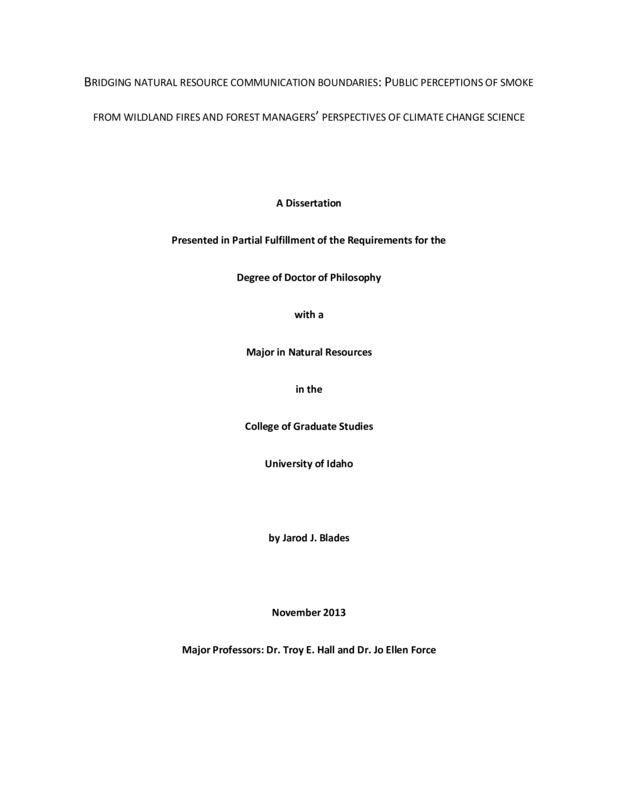BRIDGING NATURAL RESOURCE COMMUNICATION BOUNDARIES: PUBLIC PERCEPTIONS OF SMOKE FROM WILDLAND FIRES AND FOREST MANAGERS' PERSPECTIVES OF CLIMATE CHANGE SCIENCE
Blades, Jarod J.. (2013). BRIDGING NATURAL RESOURCE COMMUNICATION BOUNDARIES: PUBLIC PERCEPTIONS OF SMOKE FROM WILDLAND FIRES AND FOREST MANAGERS' PERSPECTIVES OF CLIMATE CHANGE SCIENCE. Theses and Dissertations Collection, University of Idaho Library Digital Collections. https://www.lib.uidaho.edu/digital/etd/items/blades_idaho_0089d_10074.html
- Title:
- BRIDGING NATURAL RESOURCE COMMUNICATION BOUNDARIES: PUBLIC PERCEPTIONS OF SMOKE FROM WILDLAND FIRES AND FOREST MANAGERS' PERSPECTIVES OF CLIMATE CHANGE SCIENCE
- Author:
- Blades, Jarod J.
- Date:
- 2013
- Keywords:
- Boundary Objects Climate Change Perception Risk Perception Smoke Wildland Fire
- Program:
- Natural Resources
- Subject Category:
- Natural resource management; Cognitive psychology; Communication
- Abstract:
-
Land managers of the northern Rocky Mountains and south-central U.S. are challenged with numerous social and ecological changes, many of which are linked to climate change. The work presented here focuses on two important research gaps: 1) managers do not understand public opinions toward smoke from prescribed fires (a necessary forest management tool) or the factors that underlie public tolerance of smoke, and 2) managers lack specific information about anticipated local climate change effects and are unable to mitigate for them. This dissertation addresses this disconnect between the current needs of land managers and the supply of scientific information related to these topics.
The studies pertaining to public tolerance of smoke integrated components from the value-belief-norm theory, protection motivation theory, and conjoint analysis to explore the relationships between personal value orientations, beliefs about the outcomes of prescribed fire, actions that could mitigate personal impacts from smoke, contextual factors, and overall tolerance of smoke. Our regional survey findings suggest that, overall, the public is generally tolerant of smoke, though tolerance is influenced by beliefs about the benefits of Rx fire, agency trust, risk perceptions, and previous health impacts. The origin of the fire, level of advanced warning, and smoke duration also influenced tolerance.
Boundary organization and object theory served as the foundation for facilitating the transfer of climate change research and knowledge between academic researchers and resource managers. We conducted four workshops in the U.S. northern Rocky Mountains and applied multiple methods of inquiry (pre- and post-workshop interviews and questionnaires) to understand how workshops and climate science were perceived as useful and credible. We found that intention to use climate change science in forest management was positively predicted by usefulness, credibility, and organizational barriers. We discuss the importance of uncertainty, visualization, and best practices for effective boundary objects and organizations.
These studies contribute to understanding public perceptions and tolerance of smoke from forest fires, and provide a better understanding of how boundary organizations and objects are effective for communicating climate change science. Further, these studies demonstrate how multiple theoretical and methodological frameworks can be used in research to produce actionable outcomes.
- Description:
- doctoral, Ph.D., Natural Resources -- University of Idaho - College of Graduate Studies, 2013
- Major Professor:
- Hall, Troy E; Force, Jo Ellen
- Committee:
- Shook, Steven R; Smith, Alistair MS
- Defense Date:
- 2013
- Identifier:
- Blades_idaho_0089D_10074
- Type:
- Text
- Format Original:
- Format:
- application/pdf
- Rights:
- In Copyright - Educational Use Permitted. For more information, please contact University of Idaho Library Special Collections and Archives Department at libspec@uidaho.edu.
- Standardized Rights:
- http://rightsstatements.org/vocab/InC-EDU/1.0/

